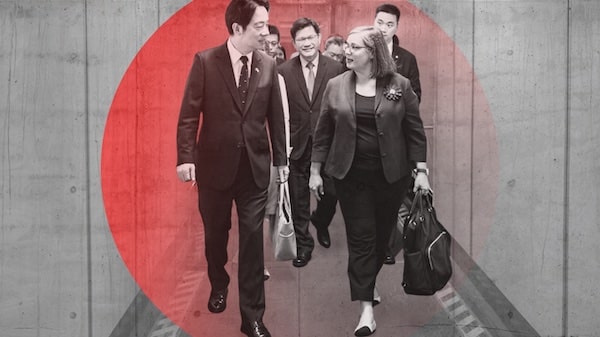Amid a controversial visit from Vice President William Lai (the front-runner to be his country’s next leader), official documents reviewed by “MintPress News” show that the Taiwanese government is attempting to drum up anti-China hostility, influence and intimidate American politicians and is even working with the FBI and other agencies to spy on and prosecute Chinese American citizens.
Key points of this investigation
- Taiwanese officials are monitoring Chinese Americans and passing intelligence to the FBI in attempts to have them prosecuted.
- Taiwan is working with “friends” in media and politics to create a culture of fear towards China and Chinese people in the US
- Taiwanese officials claim they are “directing” and “guiding” certain U.S. politicians.
- Taiwan is monitoring and helping to intimidate U.S. politicians they deem to be too pro-China.
- The island is spending millions funding U.S. think tanks that inject pro-Taiwan and anti-China talking points into American politics.
WORKING WITH THE FEDS TO PROSECUTE CHINESE AMERICANS
Vice President Lai’s journey to the United States is, officially, only a stopover on his way to Paraguay (the U.S. does not formally recognize Taiwan as an independent state). He is scheduled to make appearances in both New York and San Francisco.
Lai himself is an outspoken leader of the growing movement for Taiwanese independence. Many nationalists see Taiwan as culturally different from the mainland and argue it would be better off as a fully independent state. To achieve this goal, they are attempting to gain American backing and influence American public opinion. China, however, sees the matter as purely internal, and American attempts to wrest Taiwan out of its orbit as a potential trigger for World War Three.
Part of the effort to influence American politics, the cables reveal, is waging a silent war against pro-Chinese groups and directly working and sharing intelligence with the FBI and other agencies. “We should grasp the opportunity to counteract and further weaken China’s grassroots influence activities in the U.S. through adopting more offensive and lethal measures,” a cable from Taiwan’s Ministry of Foreign Affairs (MOFA) reads. The same document instructs all offices of the Taipei Economic and Cultural Representative Office (TECRO or TECO)—Taiwan’s de facto U.S. embassy and consulates—to cooperate with local law enforcement.
“We are happy to witness that some local offices have already started exchanging intelligence related to China with U.S. federal staff. All offices are mandated to keep track of China’s activities and enhance the frequency of sharing information with U.S. officials,” the Ministry of Foreign Affairs notes.
The exchanges between the different Taiwanese agencies make clear that Taiwan sees Chinese Americans as suspect and all pro-China or anti-Taiwanese sentiment expressed by Chinese Americans as possibly directed by Beijing itself.
“Chinese Americans have already adapted to the mainstream society, serving as the major channel for Chinese consulates to influence local politics, economics, culture, education and community groups. Their presence and activities pose great threats for Taiwan,” the New York TECO office wrote, which also noted that it had infiltrated some of these groups.
Earlier this year, Chinese American groups protested Taiwanese President Tsai-Ing Wen’s visit to the United States, upstaging the event. The demonstrations, TECO New York alleged, were led by the United Chinese Association of Brooklyn and the Chinese American Community Affairs Council.
Angered by this, it appears that Taiwan attempted to have these groups arrested and prosecuted as foreign agents, despite lamenting that they could find no evidence they broke any U.S. laws. As one cable noted:
The U.S. government is acutely aware that protesting and freedom of speech are guaranteed by the Constitution. Although it knows that Chinese Americans keep in constant contact with the Chinese Consulate in New York, it is quite difficult to charge them in ways that the FBI sued Chinese Americans.
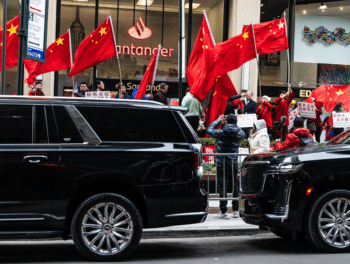
Chinese Americans protest Taiwanese President Tsai-Ing Wen’s visit to the United States in New York on March 31, 2023. (Lev Radin | AP)
The plan, it seemed, was to continue to monitor pro-China groups in the hopes that they could find something actionable. As TECO New York wrote:
If we can collect clear and concrete evidence that Chinese Americans and community groups are directed by Chinese government, they will likely be prosecuted by the U.S. We are supposed to maintain the communication with U.S. law enforcement continuously, and share updated intelligence about Chinese Americans and community groups in our jurisdiction, in order to assist the U.S. to get hold of potential illegal actions by pro-China individuals and community groups.
“MintPress” approached both TECO New York and the United Chinese Association of Brooklyn for comment but did not receive a response.
The FBI has already helped create a culture of fear among Chinese Americans. For example, the agency falsely accused Professor Xiaoxing Xi of Temple University of spying for Beijing. During their investigation, the FBI unlawfully searched his house and held his family at gunpoint. Xi is currently suing the government. A survey taken earlier this year found that 72% of Chinese researchers in the U.S. felt unsafe, and most were looking into pursuing job opportunities elsewhere.
MONITORING, INTIMIDATING, “DIRECTING,” AND “GUIDING” U.S. POLITICIANS
The Ministry of Foreign Affairs also directs TECO staff to investigate and pressure American politicians who they deem too friendly with China, attempting to create a climate of fear and suspicion in the process.
Two prominent U.S. politicians the cables highlight are Governor of New York Kathy Hochul and Mayor of New York City Eric Adams. The Ministry of Foreign Affairs wrote that they should help “our allies in politics, academia and the media” to investigate their relations to China. As MOFA stated:
We should encourage our allies to probe and expose the relations between Chinese American community groups and local politicians, and employ the current backdrop skeptical of China in U.S. society, which will make U.S. citizens stay alert with pro-China politicians, and warn them to show restraint and spontaneously distance themselves from China under the backdrop.
While it is not explicitly stated how much—if any—influence Taiwan had in its publication, the documents also reference a series of hit pieces in “The National Review,” painting Hochul and Adams as suspiciously close to Communist China. One noted that Hochul enjoyed a “long-standing collaboration” with a genocide-denying Communist official who supports China’s “baseless claims to sovereignty over Taiwan.” Another article, which featured considerable FBI input, reported that both Hochul and Adams had received donations from Chinese Americans alleged to be secret police officers for Beijing.
The state of Utah has also turned into an unlikely battleground between China and Taiwan. In March, an “Associated Press” report headlined, “Amid strained U.S. ties, China finds unlikely friend in Utah” smeared a number of local politicians from the Beehive State, dubiously presenting them as in Beijing’s pocket. One legislator was questioned by the FBI after he introduced a resolution expressing solidarity with China in the early stages of the COVID-19 pandemic, while a professor advocating for closer U.S./China relations was questioned twice.
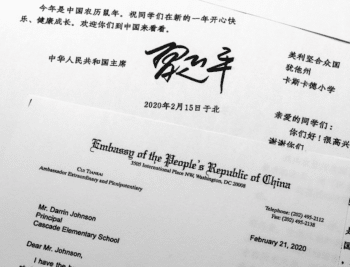
This letter from Chinese President Xi Jinping to an Utah Elementary School in early 2020 was presented as evidence of China’s malign influence in the state. (Jon Elswick | AP)
Again, it is not clear whether Taiwan had any role in the story’s publication, although we do see the FBI/media/Taiwan nexus once again appearing. What is certain, however, is that they took full advantage of it. Another legislator highlighted in the AP report quickly rushed out a statement strongly supporting Taiwan and made a number of promises to the island. Fearing being smeared as pro-China, many Utah state representatives have since joined the Utah-Taiwan Friendship Caucus. Utah has also passed a number of pieces of pro-Taiwan or anti-China legislation.
Many of these bills have been promulgated by Candice Pierucci, a Republican legislator that the San Francisco TECO office describes as a “pro-Taiwan and promising political figure.” The wording of the TECO cables suggests Taiwan might consider Pierucci as under their control or direction. “Our office has directed Pierruci to follow the trend and lobby more lawmakers to join the Utah-Taiwan friendship caucus,” TECO San Francisco wrote. “We also guided Candice to take advantage of the AP reports to enhance her media exposure on ‘AP’ and ‘Fox News’ in order to shape her as a pro-Taiwan advocate,” it added (emphasis added).
MintPress approached TECO San Francisco and Pierucci for comment but has not received a response.
INFORMATION WAR
Anti-China hostility, both among elites and in the general population, has been rapidly rising in America. A recent Gallup poll found that only 15% of respondents viewed China in a positive light—an all-time low. As recently as 2018, a majority of Americans (53%) viewed the country favorably. However, increased hostility from Washington and a barrage of negative sentiment from politicians and media outlets has seen this figure fall. Hate crimes against Asian Americans have skyrocketed.
Conversely, support for Taiwan has been rising for decades, with the same Gallup poll finding a record-high 77% of Americans view Taiwan positively. Nearly nine in ten consider the conflict between China and Taiwan—a struggle between a state and an island the U.S. officially recognizes as part of China—as an “important” or “critical” threat to U.S. vital interests. Only 10% of Americans think it is relatively unimportant to U.S. national interests.
Part of this dramatic shift in outlook is down to Taiwanese efforts to bankroll a plethora of top U.S. think tanks. A 2021 “MintPress News” study found that TECRO had given millions of dollars to many of the most influential think tanks in the United States, including the Carnegie Endowment for Peace, The German Marshall Fund, the Center for a New American Security, the Center for Strategic and International Studies, the Hudson Institute, the Atlantic Council and the Center for American Progress.
These think tanks, in turn, pumped out papers, reports and other content supportive of Taiwan, highly critical of Beijing, and arguing that the U.S. needs to defend the former from the latter. For example, in 2019, TECRO donated between $250,000 and $500,000 to the Brookings Institute. Brookings, in turn, championed the island and routinely condemn Beijing’s attempts to bring it closer into its orbit.
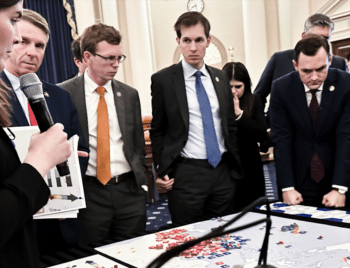
Lawmakers in a new House select committee on China gather for a tabletop Taiwan war game exercise, April 19, 2023, in Washington. Ellen Knickmeyer | AP
However, while Taiwanese efforts might have played some role in it, most of the U.S. hostility towards China is entirely homegrown. China’s rapid economic rise has many in Washington worried that the U.S. is no longer the global hegemon. The country has turned itself into a manufacturing powerhouse and the top trading partner of more than 120 nations. China’s economy is expected to overtake the United States relatively soon. Worse still, in Washington’s eyes, is Beijing’s appetite for gigantic infrastructure projects all over the world, bringing countries closer to China and further from the United States.
China has become a world leader in a myriad of cutting-edge technologies, including 5G communications, high-speed rail, semiconductors, electric vehicles and solar energy. Unable to compete, the U.S. has pressured other nations to ban Chinese tech (and rely on America). Yet, its sanctions regime on Beijing appears to have done little to stymie China’s continued rise.
Instead, Washington’s goal appears to be to shift the conflict from the economic field towards a military one. Since President Obama’s “Pivot to Asia,” successive administrations have pulled military resources away from the Middle East and towards the Pacific. Today, the U.S. has an estimated 400 military bases surrounding China, and it has attempted to foster an “Asian NATO” of states willing to counter China’s rise.
Information warfare is also a critical component of the new struggle to halt Chinese growth. The U.S. banned sales of Huawei and ZTE electronic products and considered blocking the popular video app TikTok due to its connections with China. Other war planners have suggested “kicking China under the table” through psychological warfare, including commissioning “Taiwanese Tom Clancy” novels intended to demonize China and demoralize its citizens.
HISTORY LESSON
The triangular relationship between the U.S., China and Taiwan goes back to the Second World War when Chinese resistance to the Japanese invasion centered around two poles. One was nationalist in character and led by Chiang Kai-shek of the Kuomintang Party. The other was the Communist resistance led by Mao Zedong.
Despite a lack of resources, the Communists proved more capable of repelling the Japanese invaders and fought the U.S.-backed Kuomintang off the mainland. The U.S. actually invaded and occupied parts of China with a force of 50,000 troops for four years between 1945 and 1949. But it soon became clear that the Communists were too powerful. The U.S. retreated, and Chiang Kai-shek and the Kuomintang fled to Taiwan, an island around 130 km (80 miles) off the mainland. There, they established a one-party state that ruled the country under martial law between 1949 and 1987. After decades of political terror and repression, the country had its first democratic presidential elections in 1996.
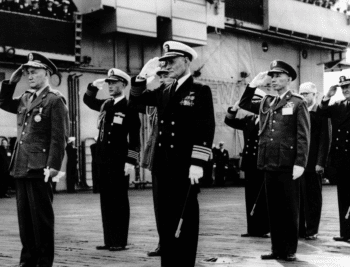
Chiang Kai-shek, left, and U.S. Navy officials salute the U.S. carrier Bonhomme Richard off Northern Taiwan on Nov. 11, 1957. (Photo: U.S. Navy)
For decades, the United States refused to recognize Mao’s Communist government, instead viewing the government in Taiwan as the rightful ruler of all of China. Throughout the 1950s and 1960s, there were many recriminations in Washington about the “loss” of China. Nevertheless, by the 1970s, it became clear that the Communists were going nowhere, and President Nixon began to pursue better relations. In 1979, the U.S. formally recognized Beijing as the sole legitimate government (thereby abandoning their Taiwanese allies). To this day, the official U.S. position is that Taiwan is not an independent state. Indeed, only a handful of countries recognize Taiwan as independent, the largest of which is Paraguay.
In the late 20th and early 21st century, China became a manufacturing hub for U.S. industry, its cheap and pliant workforce generating gigantic profits for corporate America. However, as China has become strong enough to pose a threat to U.S. dominance, attitudes to it in Washington have begun to sour. Today, in an attempt to weaken their rival, the U.S. is supporting a number of separatist movements, including in Tibet, Hong Kong, Xinjiang and Taiwan.
TAIWAN’S FUTURE
Regardless of what the major powers want, support for independence in Taiwan itself has been growing. A recent poll found that 21% of Taiwanese people want the country to gradually move towards independence, while 4.5% favored an immediate break with China. The large majority, however, favored keeping the status quo situation continuing. Few advocated for unification with China.
China, however, sees Taiwanese independence as a red line, meaning increased Western attempts as pulling the island away from Beijing could result in it becoming the Ukraine of Asia. A recent poll found that most mainland Chinese would back a full-scale invasion of Taiwan. Given China’s position, then, Taiwanese politicians will have to tread carefully and deploy masterful diplomacy.
Lai, who has previously referred to himself as a “practical worker for Taiwan independence,” has attempted to encourage the U.S. to get more involved in the debate. “If Taiwan is safe, the world is safe, if the Taiwan Strait is peaceful, then the world is peaceful…We are already on the right track. Don’t be afraid and turn back because of the increased threat from authoritarianism. We must be brave and strong,” he said on Sunday.
Clearly, then, Lai sees the United States as key to the future prospects of a more independent Taiwan. The documents seen by “MintPress” clearly underscore this, though few would guess the extent to which Taiwan is meddling in U.S. affairs in its attempt to drum up support for this goal.

